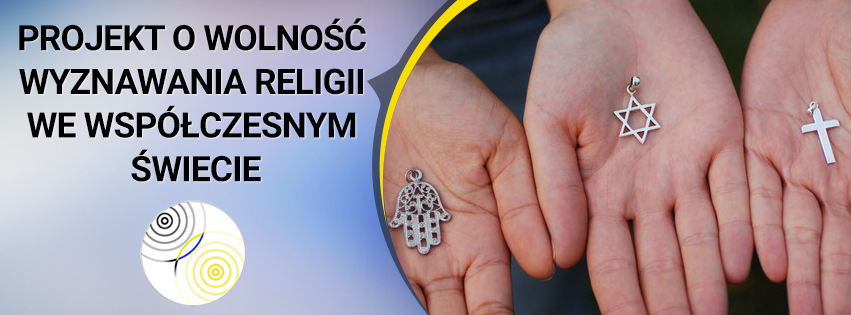ABOUT THE PROJECT
For the freedom to profess religion in the contemporary world


Logo - concentric circles propagating like a wave symbolize the voice. There are two sources for this voice - it means dialogue. Where the waves merge with each other, a fish-like object is created from them - this refers to the words of Saint Paul that "faith is born of listening", but at the same time it is a suggestion that where there is dialogue, new things arise. These new things are expressed in a color that has become more saturated as a result of the interaction of two voices in the dialogue.
Project goals
The main goal of the project is to analyze and develop ways to prevent religious hate crime. The project is interdisciplinary and combines various areas of law, as well as using various methodologies. The research concerns criminological issues, human rights, European Union law and Polish law. Research questions vary and range from doctrinal and theoretical analysis of basic issues, through systematization or systematic comparison of legal norms, to the proposals of legal reform and solutions to current legal problems related to preventing religious hate crime in Poland and in the world.
Specific goals
1. Characteristics of religious hate crimes against Christians
A key aspect of the project implementation is the analysis of the legal situation of religious minorities in the world. This analysis is conducted on the example of Christians, because it is the most disadvantaged religious group - according to the 2016 PEW Research Center, it is harassed in 144 countries around the world. (https://www.pewforum.org/2018/06/21/global-uptick-in-government-restrictions-on-religion-in-2016/). The research concerns criminological issues, human rights, European Union law and Polish law. As part of the project, this problem is analyzed from a criminological point of view, as well as from the perspective of international community challenges. This problem is solved by means of classical doctrinal legal analysis, with particular emphasis on sources of law, including case studies, but social science methods are also used to explain the attitudes of individual countries.
2. Characteristics of religious hate speech
Hate speech goes beyond causing harm to individual members of a religious group. It can be the foundation for later broad attacks on these groups, which may include discrimination, ostracism, segregation, deportation, violence and, in extreme cases, even genocide. On the other hand, however, freedom of speech, and especially the opportunity to express views criticizing religion, is the foundation of a democratic state. To bring the solution to this dilemma closer, the research is interdisciplinary and based on the conclusions of theology, ethics, law, anthropology, cultural studies and media studies. These are comparative studies covering both "horizontal" comparisons (between different national systems) and "vertical" comparisons (between national, European and international systems).
3. Characteristics of religious freedom
Religion is an integral aspect of social life. Balanced with the requirements of an ideologically neutral state, it is necessary in democracy, because it reflects the essence of the identity of the community or individual persons. Legal material is analyzed by traditional doctrinal methods, but the study also introduces innovative elements such as implications for religious freedom from the point of view of other fields of science.
Institutional cooperation
The project is carried on with the participation of researchers from two scientific centers: the Faculty of Theology of the Nicolaus Copernicus University in Toruń and the Faculty of Law and Administration of the Jagiellonian University.
In addition, research collaboration is conducted through scientific visits and common book publications with experts from the following universities: Andean University, Santiago; University of Cyprus; Jean Monnet LUM University; University of Naples Federico II; University of Navarra; University of Notre Dame, Australia; Oxford University; University of Sapienza, Rome; University of Silesia in Katowice; University of Coimbra; University of Reading and University of Warsaw.
PROJECT

Counteracting the causes of discrimination and helping the persecuted based on the example of Christians



